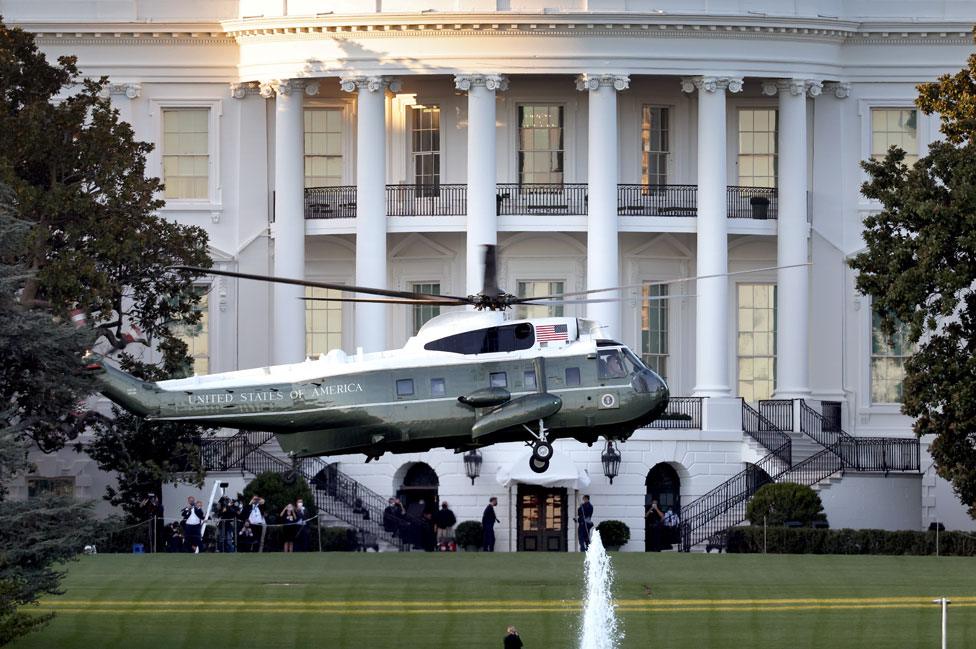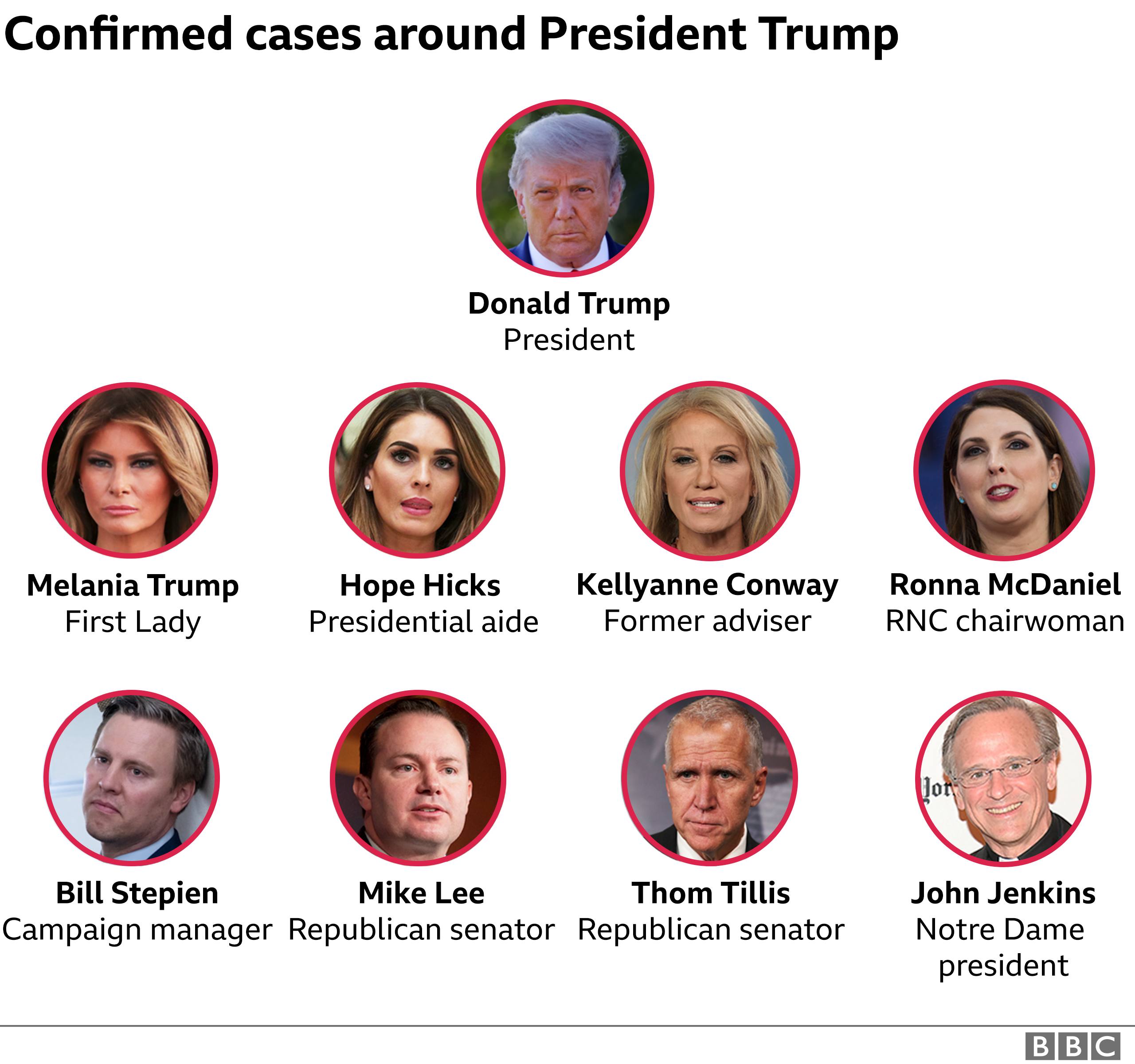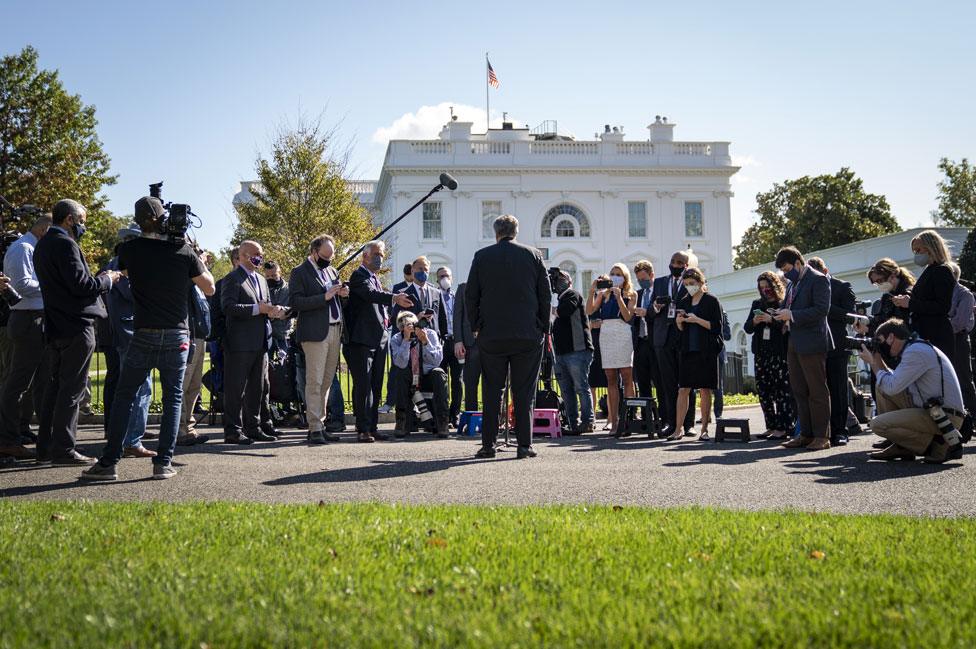Trump and the virus: A day of turmoil in the White House
- Published

For months US President Donald Trump and his aides have regularly gone without masks, often appearing to behave as if there was no pandemic. Then the president tested positive, and their world changed. This is the story of a seismic day.
Early on Friday evening, it was peaceful at Walter Reed National Military Medical Center, nine miles (14km) from the White House, and so quiet you could hear an acorn drop. But the mood was tense. Police tape was stretched from a tree to a basketball hoop, marking the landing zone for Marine One, the president's helicopter, and a dog sniffed for explosives. Donald Trump would arrive soon, and no-one knew quite what to expect.
A security official tried to tell his colleagues where they should stand for the arrival of the president's helicopter. The official admitted that his plan was a work in progress. "I don't think anyone knows what's going on," he said.
It was an accurate observation outside the hospital - and for much of the day at the White House, too.
The uncertainty began in the early morning hours, just before 01:00 in Washington, with the president's announcement on Twitter that he had tested positive. Afterwards, White House aides and staffers did their best to maintain a sense of normality in the midst of a chaotic environment, but the mood spiralled into something that looked a lot like chaos. There was anxiety, shouting and a few tears.
The president had long managed to project a sense of optimism about the US health crisis - as if he could will the pandemic away. More than 200,000 people have died with Covid-19 in the US, yet he has been saying recently that the pandemic is "getting under control". , external
In a pre-recorded address to a charity event on Thursday, Mr Trump asserted that "the end of the pandemic is in sight". Meanwhile at a presidential debate earlier this week, he made fun of his Democratic rival, Joe Biden, for always wearing a mask.
The president's claims and the language that he uses to talk about the virus alienate many Americans. However, his approach appeals to his base of supporters, men and women who are conservative and mostly white - a group of individuals who resent the Democratic elites in Washington and other cities.
US President Donald Trump on Covid-19 in his own words
The president's casual language about the virus over the last few months has been amplified by his aides and staffers in both their words and actions. They often seemed to exist in a pre-Covid era. Few of them wore masks at their offices in the West Wing, and they crowded together at small lunch tables next door at the Eisenhower Executive Office Building. They invited hundreds of guests onto the south lawn at the White House for events.
The administration relied on rapid Covid-19 testing machines to screen those in contact with the president. But experts have raised questions about the reliability of the quick turnaround tests, suggesting they might have given officials a false sense of security.
Now the president is sick, and his aides are struggling to cope with the reality of the virus as it unfolds around them and invades their offices. One of the president's top advisors, Hope Hicks, has tested positive, as has his campaign manager Bill Stepien, two Republican senators, and Ronna McDaniel, the Republican National Committee chairwoman.


Senior White House staffers are now in isolation. Junior staff members were frantically fielding calls as part of a massive contact tracing programme. News about the president's visit to the hospital leaked accidentally - by someone who sent an email before reading it.
In the midst of the confusion, White House aides have tried to put on a brave face. The president's economic adviser, Larry Kudlow, assured me and other journalists on Friday morning that the president was working hard and that there was plenty of good economic news.
Besides, Mr Kudlow pointed out, the president was not the first world leader to become infected - the leaders of Britain and Brazil had both had the virus. "Prime Minister Boris Johnson in London, who's a longtime friend of mine, had a very rough time of it - a very rough time," Mr Kudlow said. "I hope and pray that President Trump does not."
In addition, Kayleigh McEnany, Mr Trump's press secretary, insisted that the White House was operating smoothly. The president was taking care of business, she said, adding: "He's had mild symptoms, but he is hard at work. We're having to slow him down a little bit."
She said that the president had spoken on the phone with senators including Mitch McConnell and Lindsey Graham.
Meanwhile in the West Wing, people were shouting. "You're in here without a mask," someone yelled at a journalist, telling him to leave the premises. A junior staffer, exhausted and overworked, broke down in tears. A miasma of uncertainty hung over the offices known as "lower press", a warren of desks cluttered with bottles of hand sanitiser, newspapers, a baseball and a hair straightener.

White House officials sought to reassure the public and the media on Friday
The anxiety of those of us who spend time in the West Wing is palpable: for months, almost no-one wore a mask while sitting at their desks in the lower press office. Now everyone in the room has one on. Journalists came here on Friday to ask officials about additional testing. Others wanted to know more about the president's condition.
On Friday three journalists who cover the White House tested positive, external, reported CNN. The reporters who remained at the White House wanted to know if they, too, had the virus. (I was tested in the morning - 10 quick swabs - and got a clean bill of health.)
By mid-afternoon, it was clear things were not going well. A staffer told me and other members of a small press pool, the journalists who follow the president, to gather for a trip to the military hospital, where we would wait for the president.
We climbed into a black van, one with government plates and dark windows. As we arrived at the hospital, the "wig-wags", or flashing lights, came on. The van pulled to a stop near the emergency entrance.
I know how powerfully the president's messages resonate with his base and how much they admire the way he has handled the health crisis ("Millions more would have died" without him, one of his supporters told me). But standing outside the hospital's emergency room, I could see that the world the president has described - one of health and prosperity, with him as its creator - was in jeopardy.
As Marine One hovered near the landing zone, yellow leaves scattered in the air. Mr Trump walked down the stairs, holding the rail, and climbed into an SUV. From the glimpse I got, he seemed subdued. It was the end of a long day for the president - and for the nation too.
President Trump's seven days before his Covid-positive test